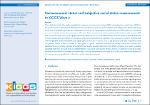Socioeconomic status and subjective social status measurement in KiGGS Wave 2
Lampert, Thomas
Hoebel, Jens
Kuntz, Benjamin
Müters, Stephan
Kroll, Lars Eric
This article describes the method applied to measure socioeconomic status (SES) and subjective social status (SSS) in
the current wave of the German Health Interview and Examination Survey for Children and Adolescents (KiGGS Wave 2),
which was conducted over three years between 2014 and 2017. The composite multidimensional SES index was calculated
as a sum of point scores for the parents’ education level, occupational status and equivalised disposable income. SSS
was assessed in the 11 to 17 year age group using a German version of the MacArthur Scale for children and adolescents.
To demonstrate the use of both instruments, we present examples that highlight the association between SES and SSS
with the general health of children and adolescents in the 3 to 17 and/or 11 to 17 age groups. Over 95% of parents rated
the general health of their children as ‘very good’ or ‘good’. However, the analyses clearly reveal that children and
adolescents from families with low SES and SSS have poorer general health than their better-off peers. Even when mutually
adjusted, both low SES and SSS are independently associated with poorer general health. In addition to the SES index,
studies on the health of children and adolescents should therefore also consider SSS. In this way, additional aspects of
the socioeconomic conditions of families can be taken into account.
Files in this item

